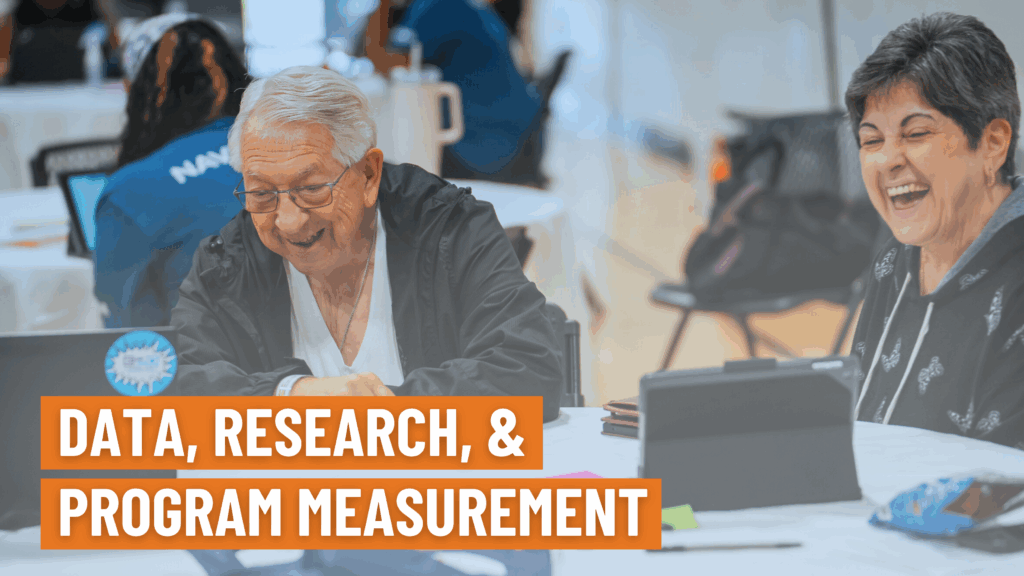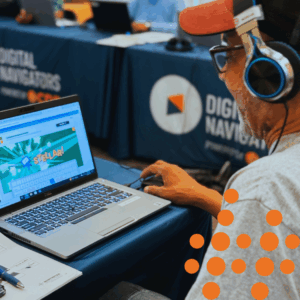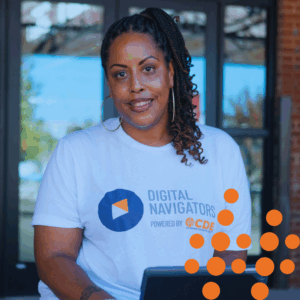
OKR: Research and prioritize workforce development and healthcare data to better understand the gaps and impact of digital equity.

Creating A Real & Lasting Impact
Over the past year, the CDE grounded its work in the voices and experiences of the community, using those insights to guide how we collect, interpret, and act on data. Guided by this input, we identified workforce development and healthcare as two of the most impactful areas for expanding digital access and opportunity. These areas significantly shape everyday life, so investing in them creates a real and lasting impact for people throughout the region.
Through this lens, our research reaffirmed that advancing digital inclusion means working across three interconnected areas:
- Ensuring Access to Devices
- Expanding Reliable Connectivity
- Building Digital Sklls
Community members and partners emphasized the need for support using tools like Google Workspace and content management systems for work, as well as help navigating healthcare platforms—such as scheduling appointments, joining telehealth visits, and accessing medical records.
Initially, collecting meaningful data across multiple partner organizations proved challenging due to the varied tools and processes employed by each organization. But after deeper collaboration, we aligned on a streamlined set of essential data points and offered one-on-one support to help partners build practical, sustainable data systems. These changes laid the groundwork for a more consistent, community-informed data strategy—one that helps us understand what’s working, where gaps remain, and how we can move forward together.
Strengthening Our Data Strategy
Over the past year, the CDE deepened its commitment to understanding how digital access connects to economic and familial well-being across the Carolinas. This work emphasized a consistent theme:
Data becomes powerful when it’s community-informed, actionable, and shared.
We began by launching a community-centered research study in collaboration with Dr. Bianca C. Reisdorf (UNC Charlotte) and Dr. Roberto Gallardo (Purdue University). This effort examines how organizations and community members experience and access digital services—and what is needed to strengthen and sustain those services in the long term. We’re using surveys and focus groups to assess partners’ readiness to engage in digital access work. We’re refining our research instruments and working with Queen’s University’s Ethics Board to ensure we collect data thoughtfully and responsibly.
This foundational work set the stage for expanding our data-sharing network. We partnered with nine community organizations—exceeding our goal of five—to build a clearer picture of Charlotte’s digital inclusion landscape. These organizations, including Camino, Goodwill of the Southern Piedmont, Per Scholas, the Latin American Coalition, and the Charlotte Mecklenburg Library, helped surface key learnings:
Early data inconsistencies led us to convene partners and align on core metrics.
A simplified set of data points and a shift to quarterly reporting made consistent tracking more feasible.
One-on-one training helped partners use their existing tools to collect reliable, high-quality data.
As these new partnerships took shape, they also helped reshape our broader strategy. In late 2024, we moved beyond simply distributing devices and began empowering partner organizations to deliver more holistic digital access programs. We provided support with curriculum design, outreach and promotion, as well as tools for measuring success. To ensure each partnership starts strong, we introduced a more structured onboarding process, offering guidance on device distribution and training plans, as well as on-site visits to share best practices and maximize impact.
Building Our Tools & Talent

We’re also building the tools and talent needed to track progress over time. Our Digital Navigators received training in advanced workforce programs, such as Senior Planet and Google Workspace, and we aligned our data collection efforts to better track adoption across connection, device access, and skill-building.
Additionally, with the support of pro bono analysts from PwC and new internal training in tools like Power BI and behavioral interviewing, we’re laying the groundwork for sustainable, in-house data analysis.
Together, these efforts are moving us toward a more innovative and connected ecosystem—one where every partner and community member plays a crucial role in shaping how digital opportunities grow.